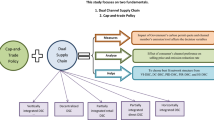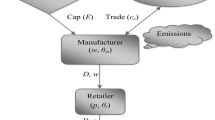Abstract
With the alarming increase in global warming, business activities are being modified by green/sustainable initiatives through immense research. This paper considers a sustainable supply chain which consists of a supplier and a manufacturer. The market demand is emissions-sensitive besides dependent on the selling price and sustainability levels of the supplier and the manufacturer. To maintain the sustainability level of the whole supply chain, both the supply chain entities make investments. The decision behaviors of the centralized and the decentralized channels are compared and a two-part tariff contract is implemented to coordinate the supply chain under the cap-and-trade policy. It is found from the numerical study that the total profit in the centralized system is almost 10% higher than that of the decentralized system. Further, the two-part tariff contract leads to a perfect channel coordination. Sensitivity analysis is performed to examine the effects of key model-parameters on the optimal decisions.





Similar content being viewed by others
References
White, L., Lee, G.J.: Operational research and sustainable development: tackling the social dimension. Eur. J. Oper. Res. 193(3), 683–692 (2009)
LMI Report: GreenSCOR: developing a green supply chain analytical tool. Report LG101T4 (2003). https://postconflict.unep.ch/humanitarianaction/documents/02_08-04_05-11.pdf
Aidt, T.S., Dutta, J.: Transitional politics: emerging incentive-based instruments in environmental regulation. J. Environ. Econ. Manag. 47(3), 458–479 (2004)
European Commission: Questions and answers on emissions trading and national allocation plans (2005). https://ec.europa.eu/commission/presscorner/detail/en/MEMO_05_84
Hua, G., Cheng, T.C.E., Wang, S.: Managing carbon footprints in inventory management. Int. J. Prod. Econ. 132(2), 178–185 (2011)
Huang, P., Zhang, X., Deng, X.: Survey and analysis of public environmental awareness and performance in Ningbo, China: a case study on household electrical and electronic equipment. J. Clean. Prod. 14(18), 1635–1643 (2006)
Penfield, P.C.: Sustainability within the supply chain. US Department of States Bureau of International Information Programs, March, 12 (2008)
Plambeck, E.L.: Reducing greenhouse gas emissions through operations and supply chain management. Energy Econ. 34, S64–S74 (2012)
Seuring, S., Müller, M.: From a literature review to a conceptual framework for sustainable supply chain management. J. Clean. Prod. 16(15), 1699–1710 (2008)
Testa, F., Iraldo, F.: Shadows and lights of GSCM (Green Supply Chain Management): determinants and effects of these practices based on a multi-national study. J. Clean. Prod. 18(10–11), 953–962 (2010)
Kumar, S., Teichman, S., Timpernagel, T.: A green supply chain is a requirement for profitability. Int. J. Prod. Res. 50(5), 1278–1296 (2012)
Dong, C., Shen, B., Chow, P.S., Yang, L., Ng, C.T.: Sustainability investment under cap-and-trade regulation. Ann. Oper. Res. 240(2), 509–531 (2016)
Zhang, H.C., Kuo, T.C., Lu, H., Huang, S.H.: Environmentally conscious design and manufacturing: a state-of-the-art survey. J. Manuf. Syst. 16(5), 352–371 (1997)
Fleischmann, M., Bloemhof-Ruwaard, J.M., Dekker, R., Van der Laan, E., Van Nunen, J.A., Van Wassenhove, L.N.: Quantitative models for reverse logistics: a review. Eur. J. Oper. Res. 103(1), 1–17 (1997)
Gungor, A., Gupta, S.M.: Issues in environmentally conscious manufacturing and product recovery: a survey. Comput. Ind. Eng. 36(4), 811–853 (1999)
Giri, B.C., Bardhan, S.: Coordinating a two-echelon supply chain with environmentally aware consumers. Int. J. Manag. Sci. Eng. Manag. 11(3), 178–185 (2016)
Giri, B.C., Mondal, C., Maiti, T.: Analysing a closed-loop supply chain with selling price, warranty period and green sensitive consumer demand under revenue sharing contract. J. Clean. Prod. 190, 822–837 (2018)
Beamon, B.M.: Designing the green supply chain. Logistics information management (1999)
Sarkis, J.: A strategic decision framework for green supply chain management. J. Clean. Prod. 11(4), 397–409 (2003)
Zhu, Q., Sarkis, J., Geng, Y.: Green supply chain management in China: pressures, practices and performance. Int. J. Oper. Prod. Manag. (2005)
Srivastava, S.K.: Green supply chain management: a state-of-the-art literature review. Int. J. Manag. Rev. 9(1), 53–80 (2007)
Linton, J.D., Klassen, R., Jayaraman, V.: Sustainable supply chains: an introduction. J. Oper. Manag. 25(6), 1075–1082 (2007)
Wu, Z., Pagell, M.: Balancing priorities: decision-making in sustainable supply chain management. J. Oper. Manag. 29(6), 577–590 (2011)
Ghosh, D., Shah, J.: A comparative analysis of greening policies across supply chain structures. Int. J. Prod. Econ. 135(2), 568–583 (2012)
Swami, S., Shah, J.: Channel coordination in green supply chain management. J. Oper. Res. Soc. 64(3), 336–351 (2013)
Ghosh, D., Shah, J.: Supply chain analysis under green sensitive consumer demand and cost sharing contract. Int. J. Prod. Econ. 164, 319–329 (2015)
Li, B., Zhu, M., Jiang, Y., Li, Z.: Pricing policies of a competitive dual-channel green supply chain. J. Clean. Prod. 112, 2029–2042 (2016)
Mondal, C., Giri, B. C., Maiti, T.: Pricing and greening strategies for a dual-channel closed-loop green supply chain. Flexible Services and Manufacturing Journal, 1-38 (2019)
Dey, S. K., Giri, B. C.: Coordination of a sustainable reverse supply chain with revenue sharing contract. J. Ind Manag. Opt. (2020)
Dobos, I.: The effects of emission trading on production and inventories in the Arrow–Karlin model. Int. J. Prod. Econ. 93, 301–308 (2005)
Jiang, Y., Klabjan, D.: Optimal Emissions Reduction Investment Under Green House Gas Emissions Regulations. Northwestern University, Evanston (2012)
He, P., Zhang, W., Xu, X., Bian, Y.: Production lot-sizing and carbon emissions under cap-and-trade and carbon tax regulations. J. Clean. Prod. 103, 241–248 (2015)
Jaber, M.Y., Glock, C.H., El Saadany, A.M.: Supply chain coordination with emissions reduction incentives. Int. J. Prod. Res. 51(1), 69–82 (2013)
Du, S., Zhu, L., Liang, L., Ma, F.: Emission-dependent supply chain and environment-policy-making in the ‘cap-and-trade‘system. Energy Policy 57, 61–67 (2013)
Du, S., Ma, F., Fu, Z., Zhu, L., Zhang, J.: Game-theoretic analysis for an emission-dependent supply chain in a ‘cap-and-trade‘ system. Ann. Oper. Res. 228(1), 135–149 (2015)
Yang, X.: Supply chain coordination contract with carbon emissions sensitive demand and green technology investments. Metall. Min. Ind. (9) (2015)
Xu, J., Chen, Y., Bai, Q.: A two-echelon sustainable supply chain coordination under cap-and-trade regulation. J. Clean. Prod. 135, 42–56 (2016)
Drake, D.F., Kleindorfer, P.R., Van Wassenhove, L.N.: Technology choice and capacity portfolios under emissions regulation. Prod. Oper. Manag. 25(6), 1006–1025 (2016)
Xu, X., He, P., Xu, H., Zhang, Q.: Supply chain coordination with green technology under cap-and-trade regulation. Int. J. Prod. Econ. 183, 433–442 (2017)
Liu, Y., Huang, C., Song, Q., Li, G., Xiong, Y.: Carbon emissions reduction and transfer in supply chains under a cap-and-trade system with emissions-sensitive demand. Syst. Sci. Control Eng. 6(2), 37–44 (2018)
Xu, L., Xie, F., Yuan, Q., Chen, J.: Pricing and carbon footprint in a two-echelon supply chain under cap-and-trade regulation. Int. J. Low Carbon Technol. 14(2), 212–221 (2019)
Qian, X., Chan, F.T., Zhang, J., Yin, M., Zhang, Q.: Channel coordination of a two-echelon sustainable supply chain with a fair-minded retailer under cap-and-trade regulation. J. Clean. Prod. 244, 118715 (2020)
Zhang, X., Tao, Z.: Two-stage supply chain optimization with consumers’ environmental awareness under cap-and-trade regulation. Chinese Control And Decision Conference (CCDC), IEEE , pp. 1584–1589 (2020)
Chen, Y., Gu, J.: Sustainability Investment of a Two-Echelon Supply Chain under Cap-and-Trade Regulation. 6th International Conference on Social Sciences and Economic Development (ICSSED 2021) (pp. 222-226). Atlantis Press (2021)
Funding
Not applicable.
Author information
Authors and Affiliations
Contributions
IR involved in model constructing and carried out the numerical studies, and also wrote the paper. BCG contributed in discussion, gave valuable suggestions, and revised the whole paper. Both the authors read and approved the final manuscript.
Corresponding author
Ethics declarations
Conflict of interest
The authors declare that they have no conflict of interest.
Additional information
Publisher's Note
Springer Nature remains neutral with regard to jurisdictional claims in published maps and institutional affiliations.
Rights and permissions
About this article
Cite this article
Giri, B.C., Ray, I. Optimal sustainability investment and pricing decisions in a two-echelon supply chain with emissions-sensitive demand under cap-and-trade policy. OPSEARCH 59, 786–808 (2022). https://doi.org/10.1007/s12597-021-00569-7
Accepted:
Published:
Issue Date:
DOI: https://doi.org/10.1007/s12597-021-00569-7




